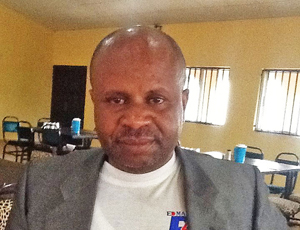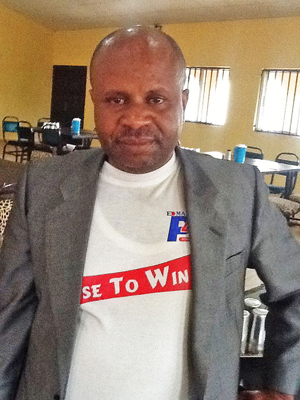
In part one of a two part article, Nigerian evangelist Habibu Adam Mohammed talks to Morning Star News about how his work in reaching out to Muslim Fulani tribesman has led to several attempts on his life but failed to deter him from the task of sharing the Gospel…
Before Boko Haram began growing into a prominent terrorist force in northeast Nigeria in 2009, its members were trying to kill a highly effective evangelist to ethnic Fulani Muslims.
One Boko Haram member pretended to be a Christian in order to kill Habibu Adam Mohammed, 49, an Islamic teacher who had longed to die as a Muslim martyr before he became a Christian 21 years ago. The group once sent a member to infiltrate his ministry and kill him, the evangelist told Morning Star News.

Habibu Adam Mohammed. PICTURE: Morning Star News.
“This incident in Mallam Fatori town brought about 130 Fulanis and Kanuris to the saving knowledge of Christ. That day I baptised many of these converts into the Christian faith until I got tired.”
“The man stayed with me and pretended to have converted to the Christian faith,” said Mohammed, who has helped lead hundreds of ethnic Fulanis to Christ. “However, after some time, he confessed to me that he was sent to kill me, but that I was a good man and so he would not kill me. He asked that I should move him away from the area, or else both of us would be killed.”
Mohammed smuggled him out of the area, and the man later rejoined Boko Haram when it tried to seize Borno state’s capital city of Maiduguri in 2014, he said.
“The shocking thing is that this terrorist had never attended even primary school, yet here he was having in his possession military, police, and other paramilitary uniforms,” he said. “He had identity cards indicating he was a serving personnel in these security agencies. I was baffled as to how he obtained them.”
The hatred for his work among the Fulanis in northern Nigeria was such that he was beaten several times, on one occasion left for dead. His house has been burned down, and Boko Haram has not ceased scheming to kill him, he said. A politician who resolved to kill him on 30th May, 2014 announced it publicly to area Fulanis the day he planned to carry it out, he said.
“Having offered prayers in the mosque, he picked up his double barrel gun and drove towards the village where I was with the intent to kill me,” he said. “A miracle happened on the way; the gun exploded as he was driving, and the gun went off, and he was shot by the bullets from his gun and he died.”
Upon hearing of the accident, Mohammed went to console the politician’s family, he said.
“This incident in Mallam Fatori town brought about 130 Fulanis and Kanuris to the saving knowledge of Christ,” he said. “That day I baptised many of these converts into the Christian faith until I got tired.”
Mobile Churches
At the time Mohammed was working with a team of evangelists in Mallam Fatori, in Nigeria’s far northeast, as part of a seven-year stint in which 500 Fulanis gave their lives to Christ, he said.
Now director of the United Faith Tabernacle Fulani Radio Program, Mohammed continues to reach Fulanis with the Gospel – and continues to flee persecution as a “lifestyle,” moving two or three times a year, he said.
“It is only when we are convinced about their decision to receive Christ that we make personal contact with them.”
– Mohammed
More than 200 Fulanis from various communities recently put their faith in Christ, primarily through the radio program, he said. Converts are located in places ranging from Mubi state on the eastern border to Kaduna state in north-central Nigeria, and his teams are discipling the largely nomadic people.
“It is only when we are convinced about their decision to receive Christ that we make personal contact with them,” Mohammed said.
A network of committed Fulani Christians are scattered throughout northern Nigeria to proclaim Christ to the largely nomadic Fulanis, disciple them and establish congregations, he said.
“But mind you, ours is an underground ministry,” Mohammed said. “So you may not find standing facilities housing Fulani congregations, but you find living churches moving from place to place to the glory of God.”
An Unlikely Convert
Before coming to Christ at age 28, Mohammed in the early 1990s had fought Christian tribes alongside other Muslim Fulanis seeking grazing land for their cattle and territory for Islam.
“The desire to go to heaven was what prompted my involvement in so many religious crises in southern Kaduna state,” he said, adding that missing a ride that would have taken him to jihad in Zangon Kataf, where all his colleagues were killed, upset him. “I cried my heart out – I mourned that I was not one of them. My desire then was to die a martyr in these conflicts fighting for Islam, because I believed that it was only through this way that I can go to heaven.”
Resolving to be killed in jihad, he sharply rebuffed attempts by Christian co-workers to persuade him of Christ’s love. He was raised in a family that didn’t allow sons to marry unless they studied the Koran enough to become preeminent teachers of Islam. Growing up, he had memorised the Quran, read the five foremost theological books of Islam and studied the sayings of the Muhammad (hadiths).
He was also an ardent reader of South African Muslim cleric Ahmed Deedat and admired his attacks on Jesus Christ and Christians. Mohammed was thrilled to meet Deedat when he visited Nigeria in the mid-1990s.
Then a Christian woman, as the wife of an army officer, was in position to request that his father help take care of her three cows. She frequently visited his family to check on her cows, and as she and Mohammed became friendly, she spoke about Christ to him. Mohammed said he used Deedat’s arguments to shoot down everything she said.
“She got tired of the arguments with me, and eventually resolved that she was no longer going to talk about Jesus Christ to me, but would instead pray for me,” he said. “She confidently told me one day that she asked God to save only one soul through her efforts, and that one soul was me. So she was not going to give up praying for me. She pointedly told me that I was too good to be allowed to go to hell.”
“That was the day I gave my life to Christ, and my whole world, my whole life, was turned upside down.”
– Mohammed
One Sunday morning he went to her house to borrow money, and as she was in a hurry, he saw no problem in accompanying her to her church service. He soon regretted entering the service, fearful of friends or relatives seeing him. He also quickly recognised the preacher as someone he had seen at the woman’s house and intensely disliked.
“Not that he did anything bad, but because he was a pastor – here was a man I hated very much coming to preach,” Mohammed said.
He preached on Noah’s ark as a foreshadowing of Christ’s salvation, and, much to Mohammed’s surprise, the message seemed “sound and authentic” to him, and he began to like the pastor. Then, he said, came a powerful work of the Holy Spirit.
“I was so carried away by this thought-provoking sermon that, in the middle of the sermon, I jumped to my feet and shouted that I wanted to receive Jesus into my life,” he said. “The ushers restrained me, as the sermon was still on, but I insisted that I should be allowed to meet the pastor to pray for me. I pushed them aside and walked over to the pulpit and asked the pastor to lead me to Christ.”
This salvation was what he had been longing for, he told Morning Star News.
“This is what I desired but could not find in Islam, and so, I was not going to let the opportunity pass me by,” he said. “The points raised by this pastor in his sermon destroyed all I heard or read from Ahmed Deedat. The sermon opened my eyes to new understanding of who Jesus is, better than what I heard preached from the Quran.”
It was 15th September, 1996.
“That was the day I gave my life to Christ, and my whole world, my whole life, was turned upside down,” he said.
After the service, he did not return to his friend’s house for the loan, and he felt he no longer had a home to return to. He stayed in the sanctuary, which had no windows or doors as it was only partially finished, and spoke to his Savior.
“Having been left alone, I felt the presence of Jesus, and I spoke to Him,” he said. “It was not a prayer, but I know I spoke to him. And this is what I told him: ‘Jesus, I know you’re right here with me, and this is where I met you. The pastor, his family, and church members have all returned to their homes, but me, I don’t have a home to return to. I used to have a home, but now trouble, pains, bitterness, and persecution are awaiting me at home. I want to say this to you, don’t let me die in their hands as you’ll be ashamed. But don’t let me deny you because of pains, instead, take my life before I deny you.’ I forgot to ask Jesus to take me away from me persecution or shield me from their troubles; I did not ask for this. This is how I ended my discussion with Jesus. After this I went back home.”
We’ll be publishing part two shortly…





